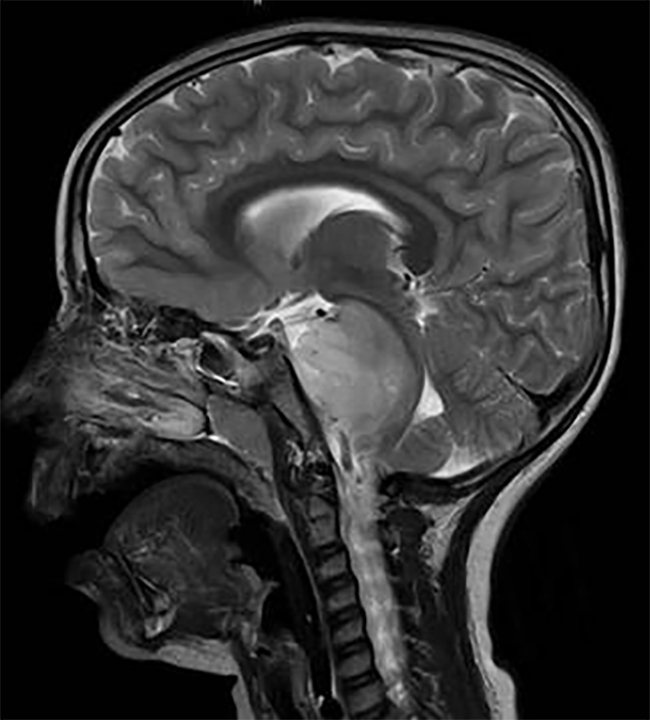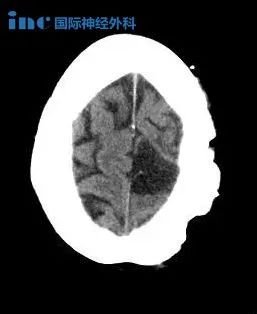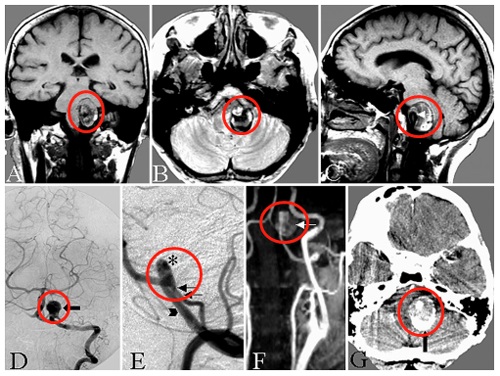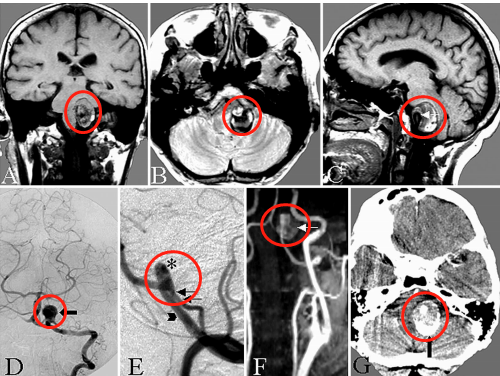脑中动脉瘤夹闭在巴罗神经学研究所破裂动脉瘤试验中的长期结果(Long-term results of middle cerebral artery aneurysm clipping in the Barrow Ruptured Aneurysm Trial)
英文摘要:
OBJECTIVE A direct comparison of endovascular versus microsurgical treatment of ruptured middle cerebral artery(MCA) aneurysms in randomized trials is lacking. As endovascular treatment strategies continue to evolve, the number of reports of endovascular treatment of these lesions is increasing. Herein, the authors report a detailed post hoc analysis of ruptured MCA aneurysms treated by microsurgical clipping from the Barrow Ruptured Aneurysm Trial (BRAT).
METHODS The cases of patients enrolled in the BRAT who underwent microsurgical clipping for a ruptured MCA aneurysm were reviewed. Characteristics of patients and their clinical outcomes and long-term angiographic results were analyzed.
RESULTS Fifty patients underwent microsurgical clipping of a ruptured MCA aneurysm in the BRAT, including 21 who crossed over from the endovascular treatment arm. Four patients with nonsaccular (e.g., dissecting, fusiform, or blister)aneurysms were excluded, leaving 46 patients for analysis. Most (n = 32; 70%) patients presented with a Hunt and Hess grade II or III subarachnoid hemorrhage, with a high prevalence of intraparenchymal blood (n = 23; 50%), intraventricular blood (n = 21; 46%), or both. At the last follow-up (up to 6 years after treatment), clinical outcomes were good (modified Rankin Scale score 0-2) in 70% (n = 19) of 27 Hunt and Hess grades I-III patients and in 36% (n = 4) of 11 Hunt and Hess grade IV or V patients. There were no instances of rebleeding after the surgical clipping of aneurysms in this series at the time of last clinical follow-up.
CONCLUSIONS Microsurgical clipping of ruptured MCA aneurysms has several advantages over endovascular treatment,including durability over time. The authors report detailed outcome data of patients with ruptured MCA aneurysms who underwent microsurgical clipping as part of a prospective, randomized trial. These results should be used for comparison with future endovascular and surgical series to ensure that the best results are being achieved for patients with ruptured MCA aneurysms.
中文摘要:
目的 对脑中动脉破裂动脉瘤的血管内治疗与显微外科治疗进行随机对照研究。随着血管内治疗策略的不断发展,血管内治疗这些病变的报告数量也在增加。在此,作者报告了从Barrow破裂动脉瘤试验(BRAT)中通过显微外科夹闭术治疗破裂的MCA动脉瘤的详细的事后分析。
方法 回顾性分析我院收治的因颅内动脉瘤破裂而行显微手术夹闭术的病例。分析患者的特点及其临床结果和长期的血管造影结果。
结果 50例患者接受了显微外科手术夹闭动脉瘤破裂的BRAT,其中21例来自血管内治疗组。排除4例非囊性动脉瘤(如解剖型、梭形或水泡型),剩下46例进行分析。大多数(n = 32;70%)伴有Hunt和Hess II级或III级蛛网膜下腔出血,脑实质内出血发生率高(n = 23;,脑室内血(n = 21;46%),或两者兼而有之。在较后一次随访中(治疗后6年),27例Hunt和Hess I-III级患者中70% (n = 19)的临床结果良好(改良Rankin评分0-2),11例Hunt和Hess IV或V级患者中36% (n = 4)的临床结果良好。在本系列的较后一次临床随访中,没有一例动脉瘤手术夹闭后再出血的病例。
结论
显微外科夹闭术治疗破裂的MCA动脉瘤比血管内治疗有许多优点,包括耐久。作者报告了在一项前瞻性随机试验中接受显微手术夹闭的MCA动脉瘤破裂患者的详细结果数据。这些结果应用于与未来血管内和外科系列的比较,以确保对MCA动脉瘤破裂的患者获得更佳的治疗效果。
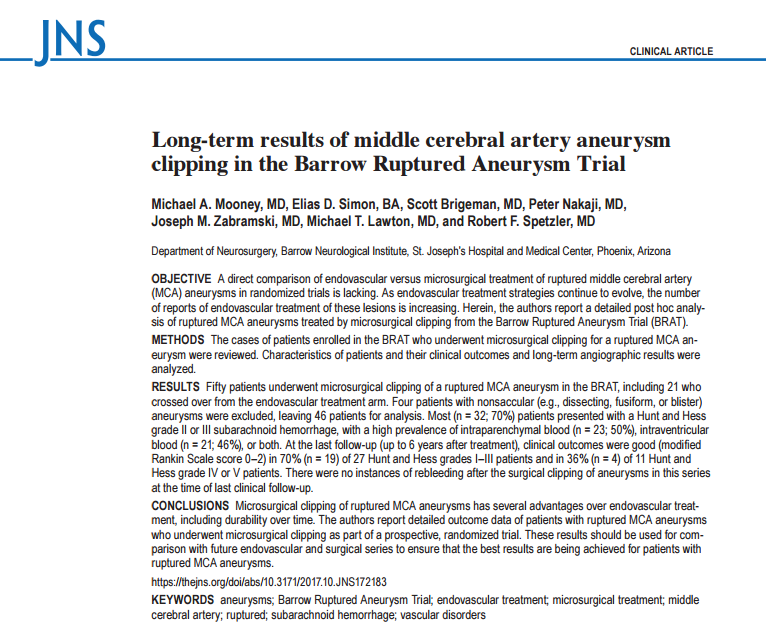
脑中动脉瘤约占全部破裂脑动脉瘤的20%-30%。这些病变由于复杂的MCA分岔或三分岔解剖结构、宽颈的频繁存在以及相关的脑实质内出血(IPH)的高发生率而给治疗带来独特的挑战。血管内动脉瘤的治疗策略历来受到这些因素的限制,迄今为止,在脑动脉瘤破裂的随机试验中,血管内动脉瘤是血管内治疗的少数病变。因此,在血管内治疗和显微外科治疗这些动脉瘤之间还没有建立起临床平衡。
该研究的主要成员之一Michael T. Lawton 教授是INC国际神经外科医生集团旗下组织国际神经外科顾问团(WANG)成员。Michael T. Lawton 教授是当今国际上享有盛誉的脑血管病教授,他专注各脑血管病、脑动脉瘤、动静脉畸形、海绵状畸形、血管搭桥、中风、颅底肿瘤的手术治疗,对于较大而复杂的脑动脉瘤手术尤为精通。此外,他还提供中枢、外周和自主神经系统疾病的手术和非手术治疗(即预防、诊断、评估、治疗、重症监护和康复),包括其支持结构和血管供应;评估和治疗改变神经系统功能或活动的病理过程。对于脑紊乱、颅外颈动脉、椎动脉、脑垂体紊乱、脊髓/脑膜和脊柱疾病(包括可能需要通过脊柱融合或器械治疗的疾病)等有丰富经验。目前拥有4400余例脑动脉瘤、800余例动静脉畸形和1000余例海绵状畸形患者的成功治疗经验。
Michael T. Lawton 教授是美国“脑血管畸形联盟”(Brain Vascular Malformation Consortium)的研究员,该组织由NIH(美国国家卫生研究所)资助进行多中心少见脑血管疾病的临床及遗传学研究,主要研究脑动静脉畸形的形成、遗传学特征和破裂的治疗,以及脑部血管瘤的血液动力学、破裂以及数字建模,涉及到血管瘤、动静脉畸形以及颅内搭桥的微创治疗方法,以及微创治疗临床数据等。
随着血管内治疗策略的演变,关于MCA动脉瘤破裂患者的更佳治疗策略的争论也在继续。迄今为止,在随机试验中血管内和显微外科治疗策略的比较有限,需要比较文献中血管内和显微外科系列的报道结果。我们提供了MCA动脉瘤破裂患者的详细的长期临床和血管造影结果,作为前瞻性试验的一部分。这些结果应作为未来研究的基准,以检验这一独特的患者组的结果。
- 文章标题:脑中动脉瘤夹闭在巴罗神经学研究所破裂动脉瘤试验中的长期结果
- 更新时间:2020-08-05 21:13:24

 400-029-0925
400-029-0925
